(Planebound AccomplicePlanebound Accomplice | Art by Paul Scott Canavan)
What's On the Horizon?
Welcome to the red segment of the Modern Horizons set review! We'll be covering some of the most notable new additions to the format, including potential synergies and some possible home for them. We're in red, which means there's no wasting time on pleasantries. Let's get to it.
Rares
Aria of Flame
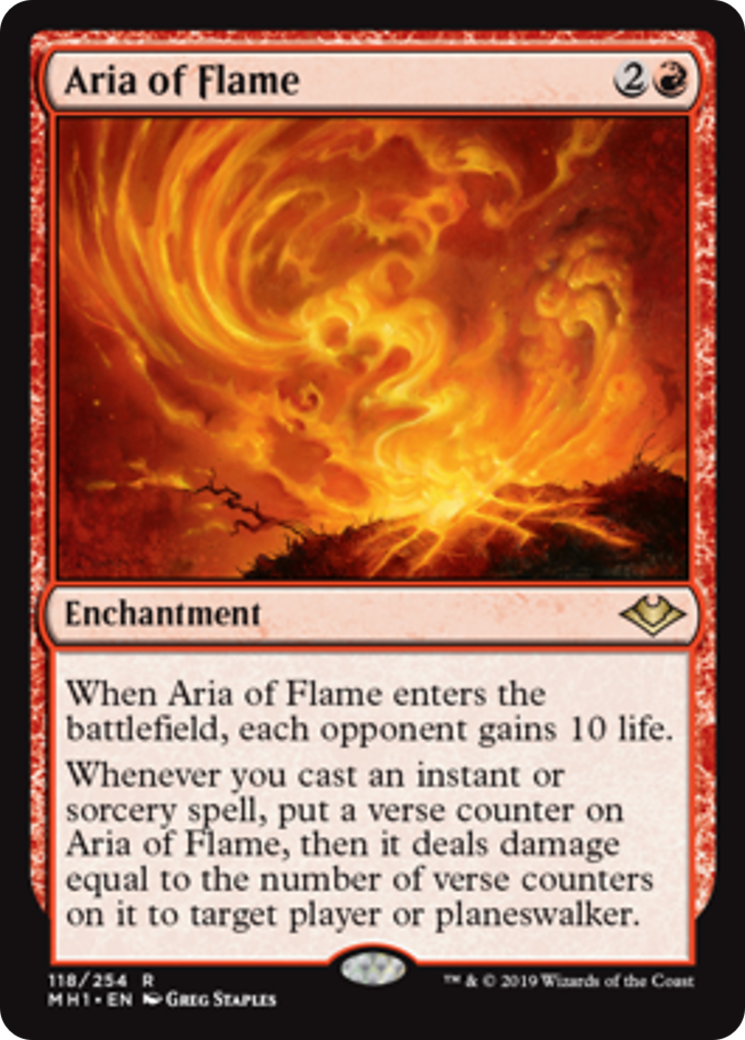
A very common problem for Spellslinger decks is that the decks can get hyper-focused on all the value from their spells. Sometimes they get so lost in the accumulation of that value that they forget that they have to actually win the game. Traditionally, this is done with a big combo, or with a Storm-style option. Aria of FlameAria of Flame is another step in the latter direction, and an interesting alternative for the archetype.
It's true that giving all opponents 10 life isn't very intuitive for a win condition, but we have to consider that this gets out of hand very fast. Sphinx-Bone WandSphinx-Bone Wand is the obvious inspiration to this card, and should be the standard by which we judge it. Although Sphinx-Bone WandSphinx-Bone Wand doesn't give each opponent 10 life, it also has a whopping CMC of 7, which makes the enchantment much more reliable. You'll have to cast five spells before you deal more damage to a single opponent than the life Aria gave them, which sounds like a lot, but much like Thousand-Year StormThousand-Year Storm, the point of the enchantment is its exponential power.
Aria of FlameAria of Flame works wonderfully in a Niv-Mizzet, ParunNiv-Mizzet, Parun list. It's cheap enough that we can play it after our commander is on the field and then hold up spells to protect both the Dragon and the enchantment. A win condition like this definitely appreciates the extra fuel that Niv-Mizzet, ParunNiv-Mizzet, Parun provides.
Ramos, Dragon EngineRamos, Dragon Engine Spellslinger lists operate in a different way than most. They use Ramos as a mana engine to start chaining multiple spells, and an effect like this is cheap enough that it will allow such decks to "gof off" much quicker (which, let's be honest, can be a relief for the entire table).
Finally, consider this in a deck alongside Tainted RemedyTainted Remedy if you want to be an evil mastermind.
Goblin Engineer
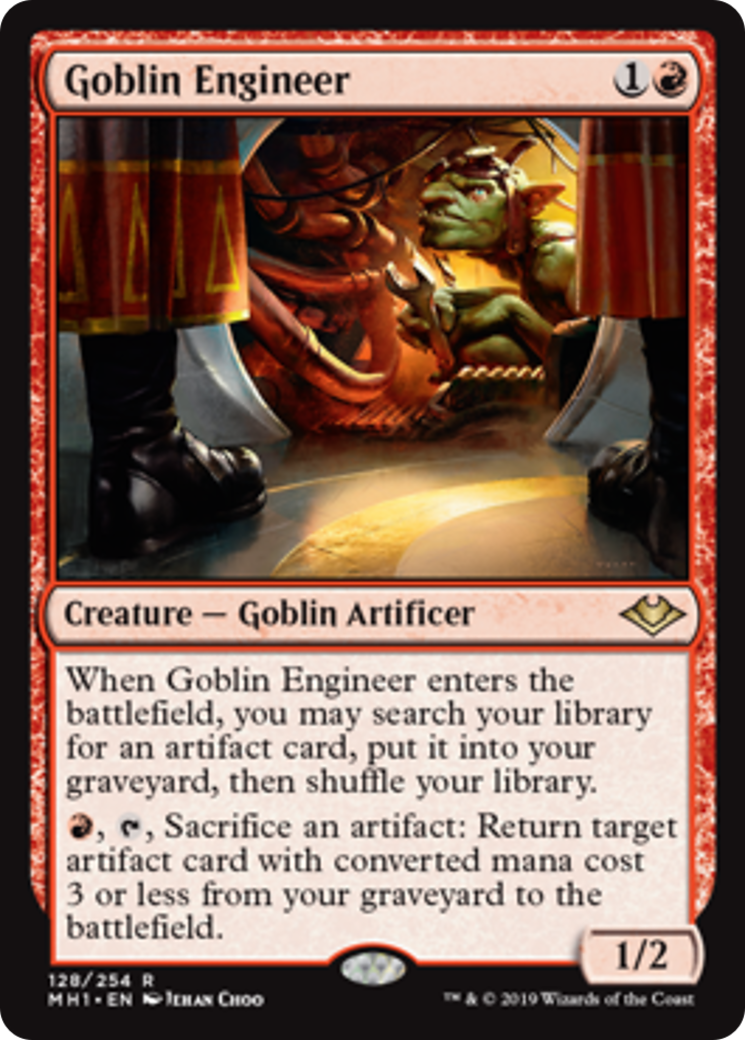
Now this is a tasty addition to a large portion of red decks. Red is great at getting artifacts back from the graveyard and because of that, this card basically reads like an artifact-based EntombEntomb. Not only do we get to tutor any artifact from our deck, but we also get a quasi-Goblin WelderGoblin Welder as well!
Daretti, Scrap SavantDaretti, Scrap Savant is the obvious go-to commander for this card, using Goblin EngineerGoblin Engineer to tutor for anything we want and then utilizing Daretti's -2 ability to reanimate it. How does having access to any artifact from your deck on turn 4 sound? Goblin EngineerGoblin Engineer's activated ability also helps Daretti, Scrap SavantDaretti, Scrap Savant grind out every opponent with the sheer amount of value.
Feldon of the Third PathFeldon of the Third Path is very similar to Daretti, Scrap SavantDaretti, Scrap Savant in the sense that he can abuse the cheap EntombEntomb effect, although he has to take some extra steps to do this. His pool of targets is much more limited than Daretti's, but having a cheap, reanimatable way to tutor for big artifact creatures and dump them right into the yard will be a pretty good addition.
Krenko, Mob BossKrenko, Mob Boss, on the other hand, doesn't initially seem like he would benefit from this card as he doesn't have a way to cheat big artifacts into play, nor does he cares about grinding out people by repeatedly using Goblin EngineerGoblin Engineer's activated ability. All of this is true, but when you factor in the relevant Goblin creature type and the fact that it gives Krenko, Mob BossKrenko, Mob Boss a one-time access to powerful low-drop artifacts - most notably SkullclampSkullclamp - it's easy to see how this can become a great addition to not only Krenko, Mob BossKrenko, Mob Boss but to the whole tribe.
Pashalik Mons
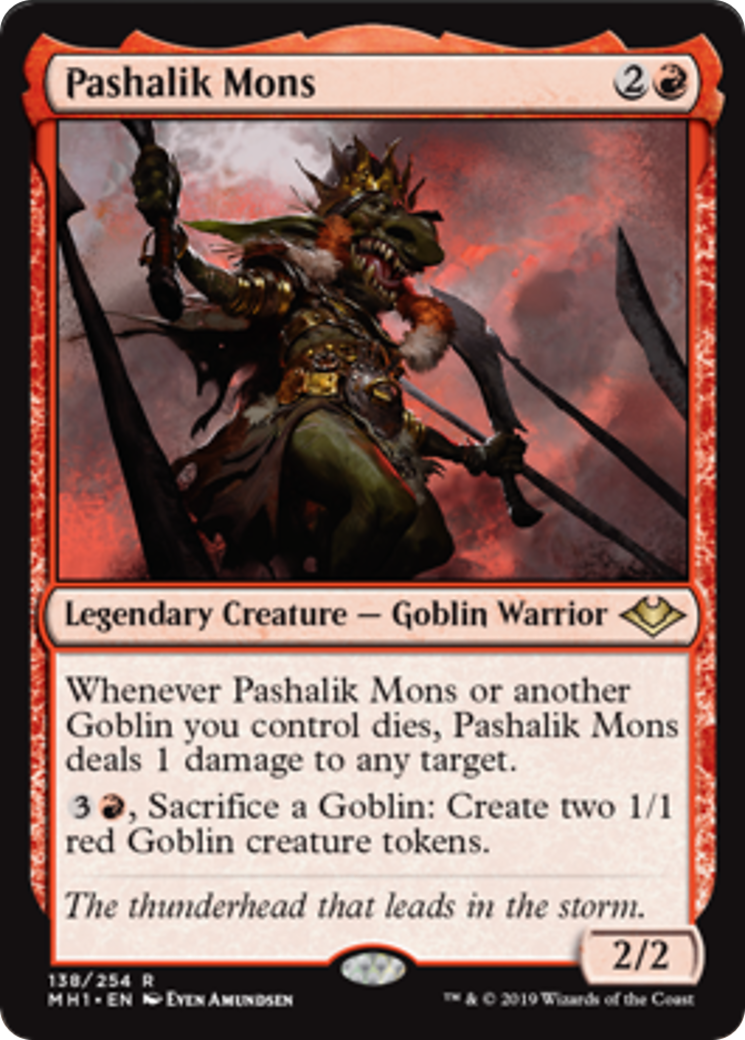
Pashalik is on point. Goblins love two things: to swarm and to die. Pashalik rewards both! As a commander there are several ways to build around his kit, from "creaturefall" effects like Purphoros, God of the ForgePurphoros, God of the Forge and In the Web of WarIn the Web of War to an infinite damage combo with Mana EchoesMana Echoes and Skirk ProspectorSkirk Prospector.
However, for great Goblin commanders, there's a lot of competition.
As the most popular Goblin commander according to EDHREC, Krenko, Mob BossKrenko, Mob Boss should always be considered the face of the tribe. Krenko is a very explosive commander that, if left unchecked for just a couple of turns, can completely take over the game on his own. It'll take a lot to make Pashalik MonsPashalik Mons as fast as he is, but, on the other hand, Pashalik can provide some value after a board wipe with his triggered ability and won't always be public enemy #1 in the way Krenko, Mob BossKrenko, Mob Boss always is.
Wort, Boggart AuntieWort, Boggart Auntie can grind out like crazy, and also has access to black, which is great for a more midrange or long-game build. Pashalik MonsPashalik Mons can outpace her (which, to be fair, isn't that hard) and has some extra "removal value," so to say. If you want the black access, you're probably choosing Wort, but if you're looking for Goblins that provide extra value from dead cards, Pashalik might be a strong (if unreliable) option.
Grenzo, Havoc RaiserGrenzo, Havoc Raiser is a card advantage machine, which at his best will make the blue player jealous. Pashalik MonsPashalik Mons obviously can't compete in this axis, but at least he provides a way for its controller to catch up, if they are behind and he also has gets more value from the common support cards, while having a lot more options of card to support him.
Pashalik has a lot of competition for other red Goblin tribal decks, but it's a fun card even if it's destined for the 99 more often than the command zone.
Planebound Accomplice
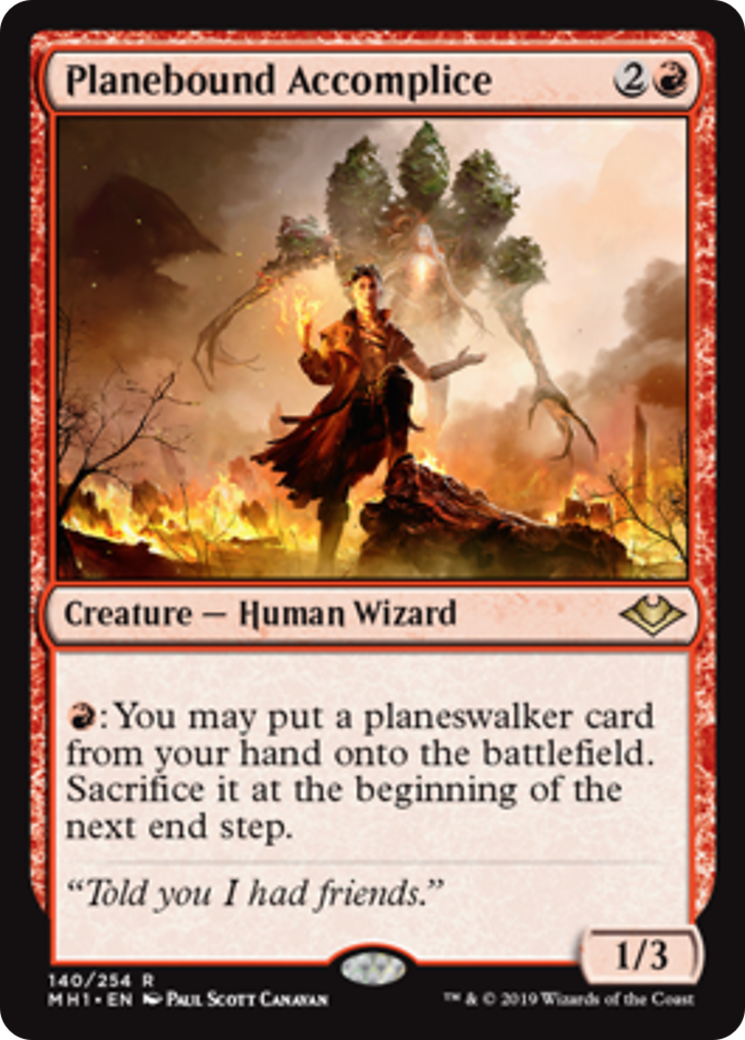
Looks like superfriends lists got a new toy. A very situational and hard-to-assemble toy, as a matter of fact. The obvious parallel, Sneak AttackSneak Attack, is a very strong card, and its power comes from its explosiveness - a free huge creature that gets to attack! Comparing it to Planebound AccomplicePlanebound Accomplice, we see a lot less explosive power. we can see that this doesn't work like Sneak AttackSneak Attack.
Accomplice's pool is much smaller than Sneak AttackSneak Attack's. Additionally, planeswalkers are slow value engines, and as such they don't benefit all that much from just a single activation. Finally, it's difficult to have a deck with such a high number of planeswalkers to even make Planebound AccomplicePlanebound Accomplice relevant.
There are some cool tricks, though. Whenever you see a Sundial of the InfiniteSundial of the Infinite, you know that its controller is up to no good. The combination of both it and Planebound AccomplicePlanebound Accomplice let us keep every planeswalker we cheat into play on our turn by activating the Sundial in response to the delayed trigger on our end step, skipping the sacrifice.
Venser, the SojournerVenser, the Sojourner is an amazing engine in a blink/superfriends decks, and when paired with Planebound AccomplicePlanebound Accomplice, he becomes even more of a threat, since any flickered planeswalker becomes a new game object, and therefore isn't required to be sacrificed. Venser would naturally play in a deck full of planeswalkers anyway, so if you're prepared with some tricks like this, the Accomplice might make up for any other shortcomings and become a nice inclusion after all.
Spiteful Sliver
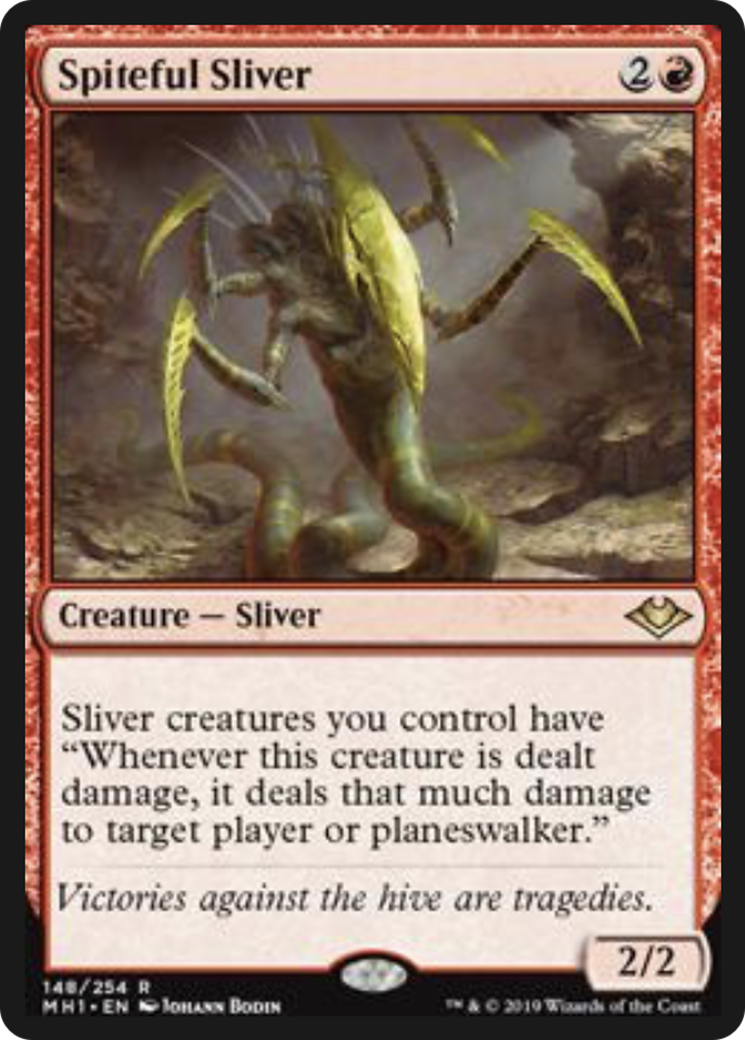
The name of this card reflects its nature very well: Spiteful. At first, this might not look all that impressive, but one thing we need to consider is how this protects our Sliver army from red-based board wipes in a weird and threatening way. Because of their swarmy nature, Slivers are naturally vulnerable to board wipes, so having this protection means that our Slivers are more likely to stay longer and cause more damage. This card also makes combat math very hard on our opponents, since whatever damage they deal to our Slivers can be dealt right back to them, or even their planeswalker. Heck, if player A blocks our Sliver, we could deal its spiteful damage to player B!
Needless to say that Spiteful SliverSpiteful Sliver is a great addition to any Sliver decks, but this card can also fill some unexpected niches. Since its ability is global, having two of them in play means that for every damage dealt to a Sliver, it deals 2 in return. So, if we copy our Spiteful SliverSpiteful Sliver with, for example, Cackling CounterpartCackling Counterpart, and then cast a red board wipe, let's say with a Blasphemous ActBlasphemous Act, that's lethal damage to one player, because each silver deals 26 back! It wouldn't be difficult to integrate this "combo" to CloneClone-based lists like Brudiclad, Telchor EngineerBrudiclad, Telchor Engineer.
Tectonic Reformation
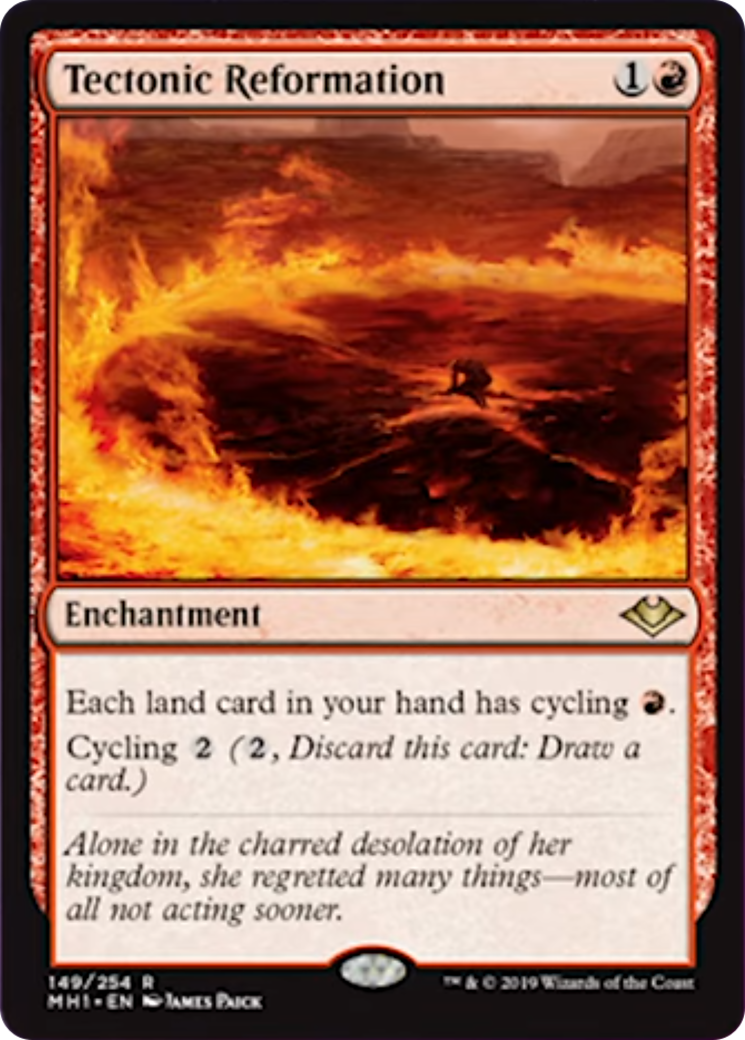
Oh boy, this card is good. In the worst case Tectonic ReformationTectonic Reformation turns our lands into gas for our mono-red and Boros decks. In the best case it's an engine in our 'lands matter' decks. Tectonic ReformationTectonic Reformation will also help enable the Cycling archetype, pairing beautifully with effects like Astral SlideAstral Slide.
Lands benefit greatly from recursion, so turning lands into other cards and then gaining more value from that land in the grave is astonishing. Don't get me started on the Dakmor SalvageDakmor Salvage combo, or even Life From The LoamLife From The Loam. We can even Cycle this card on its own when we don't need it!
With the release of C18 we got the three-color monstrosity known as Lord WindgraceLord Windgrace. He has access to the most important Landfall colors, loves discarding lands, and loves bringing them back. Tectonic ReformationTectonic Reformation will help him grind out faster, by giving him a consistent way to draw while also fueling the graveyard with a lot of land goodies.
Many mono-red and Boros decks will take advantage of this enchantment, but I'll mention one in particular: Neheb, Dreadhorde ChampionNeheb, Dreadhorde Champion. Tectonic ReformationTectonic Reformation can help circumvent Neheb's biggest weakness: drawing multiple lands and not having anything to do with his mana. With this card in play, we can do-over the lands we draw, digging faster and faster for more powerful cards.
Uncommons
Alpine Guide
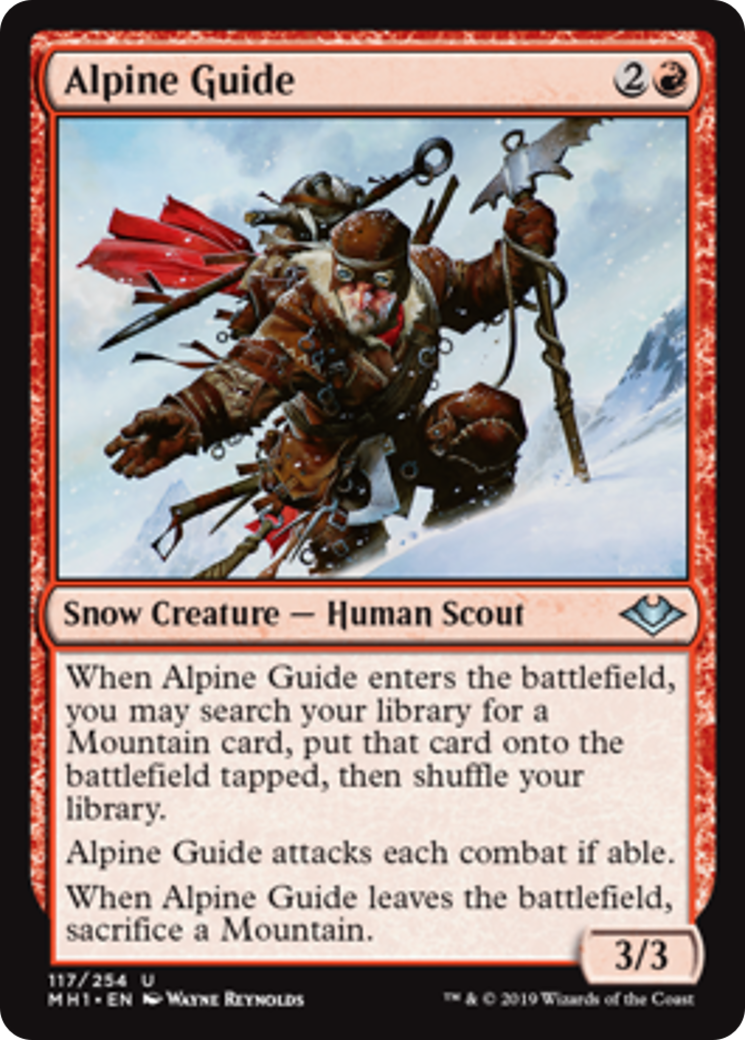
Alpine GuideAlpine Guide is a red version of Wood elvesWood elves, but with the major downside of losing a land when it leaves the battlefield... and also having to attack each turn. This effect is pretty lackluster, even for decks that want to have lands in the graveyard. Paying three mana for one land and eventually having to sacrifice one mountain is weak, specially when better effects like HarrowHarrow already exist. One could argue that this effect being stapled to a creature could be useful, but decks that care about lands and decks that care about creatures tend to pull in two different directions. Sorry, Apline Guide, but even if you find me a Stomping GroundStomping Ground and I sacrifice a regular MountainMountain when you leave, I feel like there were better options I could have used in this slot.
Hollowhead Sliver
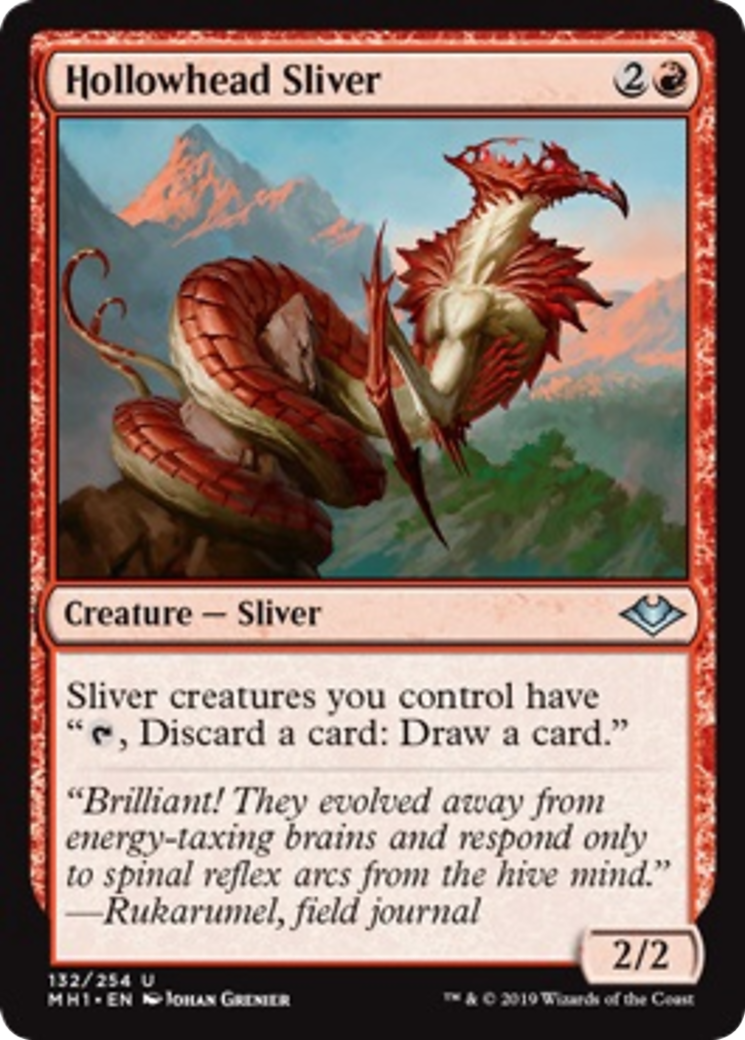
Another great Sliver potentially more wicked than the aforementioned Spiteful SliverSpiteful Sliver! Hollowhead SliverHollowhead Sliver's effect is great with the go-wide nature of Slivers, and it means you'll never have to worry about any dead cards in your hand. This Sliver doesn't beat your opponents over the head with obvious value, but it does valuable work behind the scenes. If you want to get especially dangerous, pair it with a Patriarch's BiddingPatriarch's Bidding.
Throes of Chaos
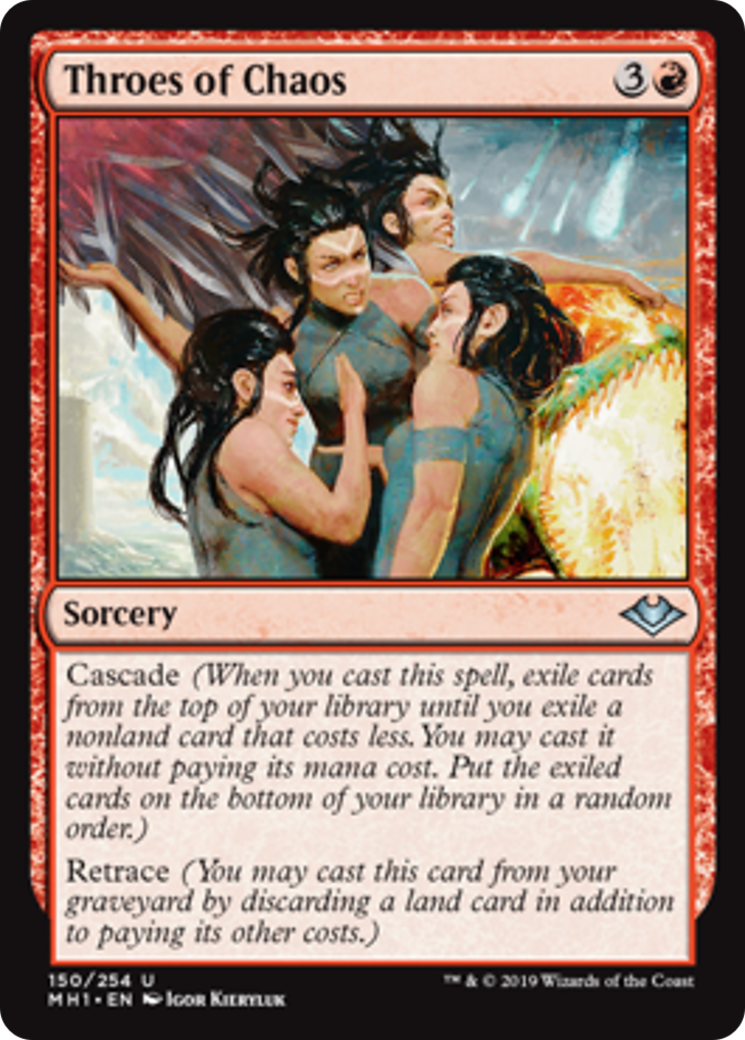
This is a fun one. It doesn't really have any effect - just two keywords. In fact, if your opponent counters this spell, it wouldn't even matter! The combination of Cascade and Retrace is truly entertaining, as the random nature of the Cascade added with the natural recursion from Retrace will generate a "Spin the Wheel" style of gameplay.
Mechanically, this card is hard to evaluate. On the one hand, it's chaotic and unreliable, but on the other, if you've planned out your Cascade targets, it's some super-big-brain tech. Yidris, Maelstrom WielderYidris, Maelstrom Wielder will probably be its best home, especially if it's played alongside zero-mana goodies like Ancestral VisionAncestral Vision. Just remember that spells cast from the graveyard won't trigger Yidris's Cascade.
Commons
Fists of flame
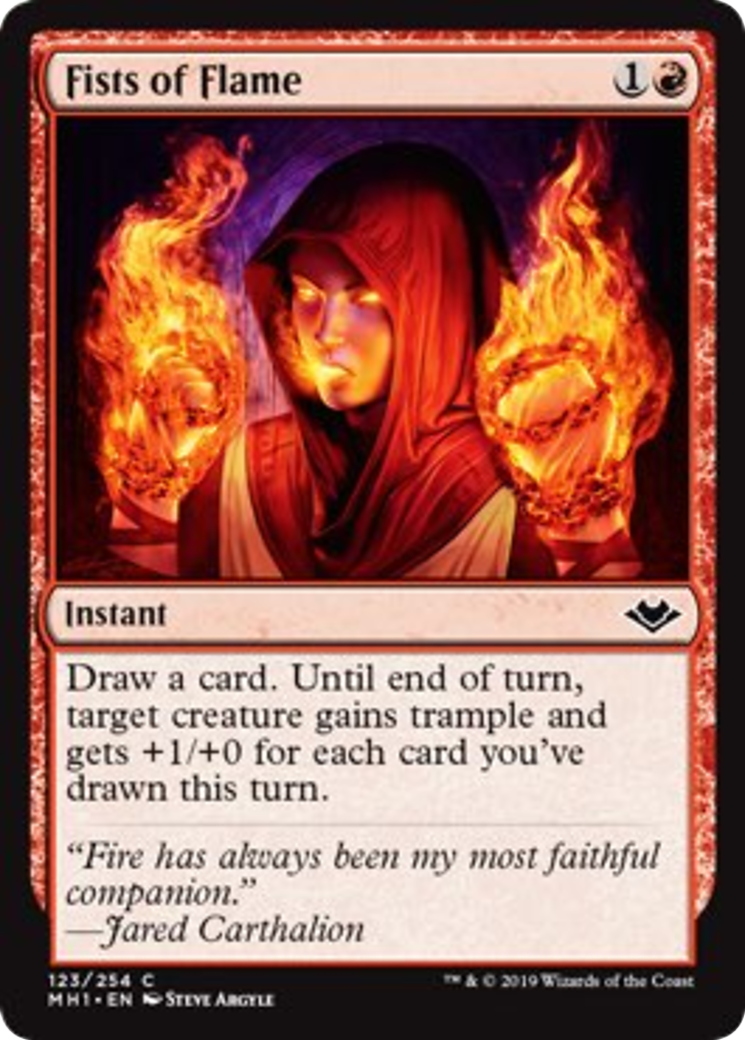
Fists of FlameFists of Flame may surprise those that don't follow EDH closely. It's a combat trick in a format where everyone starts at 40 life, after all. However, when you understand the nuances of how some decks operate, we can very easily find a home for this card. At its lowest, we draw a card and give a creature trample and +2/+0 until end of turn (assuming it was played on our turn). Not a bad deal, but nothing to write home about. However, that's just what happens when we play Fists of FlameFists of Flame alone. When we factor in other combat tricks and cantrips, we start to tumble down a very deep rabbit hole.
Zada, Hedron GrinderZada, Hedron Grinder will likely want this card the most, since copying this ability on multiple creatures is simply absurd. The best part about this card in a Zada deck is that, while it's resolving, your opponents can go grab some lunch, go to the bathroom, or even learn a new language before coming back to the game, and they won't miss a thing because you're still playing solitaire! Seriously, try to resolve this spell with four or five creatures and Zada on the field.
On the other side of the aggro spectrum, Shu Yun, the Silent TempestShu Yun, the Silent Tempest and Feather, the RedeemedFeather, the Redeemed will also appreciate everything that Fists of FlameFists of Flame offers, from the card advantage to the trample to the super-fun power boost. Watch out for the one-punch K.O.!
Shenanigans
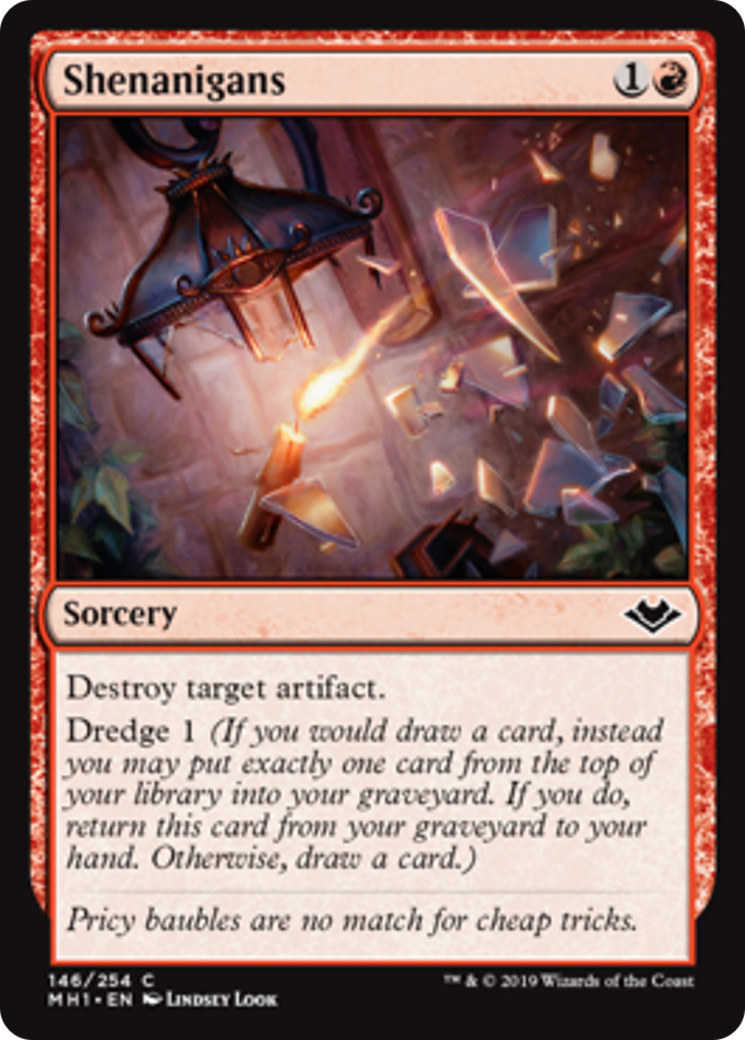
ShenanigansShenanigans is a nice little twist in the good ol' ShatterShatter, with the added benefit of almost being constantly available. Its downside is certainly important; sorcery speed prevents it from answering some of the major artifact threats, like Paradox EngineParadox Engine, which famously tend to "go off" on the same turn they're played.
These are some of the competition that ShenanigansShenanigans has to face. VandalblastVandalblast is great, relatively cheap to Overload, is asymmetric, can get around hexproof, and is an all-around format staple for a reason. Shattering PulseShattering Pulse, like ShenanigansShenanigans, is artifact spot removal with Buyback. Though this makes it more expensive, it doesn't force you to skip your draw step. Last but not least, there's Shattering SpreeShattering Spree, which works in a middle ground between spot removal and board wipe, but it has the added benefit of being great against counterspells. ShenanigansShenanigans sounds fun - especially if paired with Liquimetal CoatingLiquimetal Coating - but in the end, even with the recursion available to it, a sorcery speed one-for-one removal spell in a color that already has access to plenty of other strong effects won't be very appealing.
The Red Dawn
So many interesting new cards, don't you think? Those were my impressions on the set, and now I want to hear yours! Did you agree with these assessments? Did I miss any cards or interaction? Please let me know in the comment section below, and let's get up to some shenanigans!
Your opinions are welcome. We love hearing what you think about Magic! We ask that you are always respectful when commenting. Please keep in mind how your comments could be interpreted by others. Personal attacks on our writers or other commenters will not be tolerated. Your comments may be removed if your language could be interpreted as aggressive or disrespectful. You may also be banned from writing further comments.
